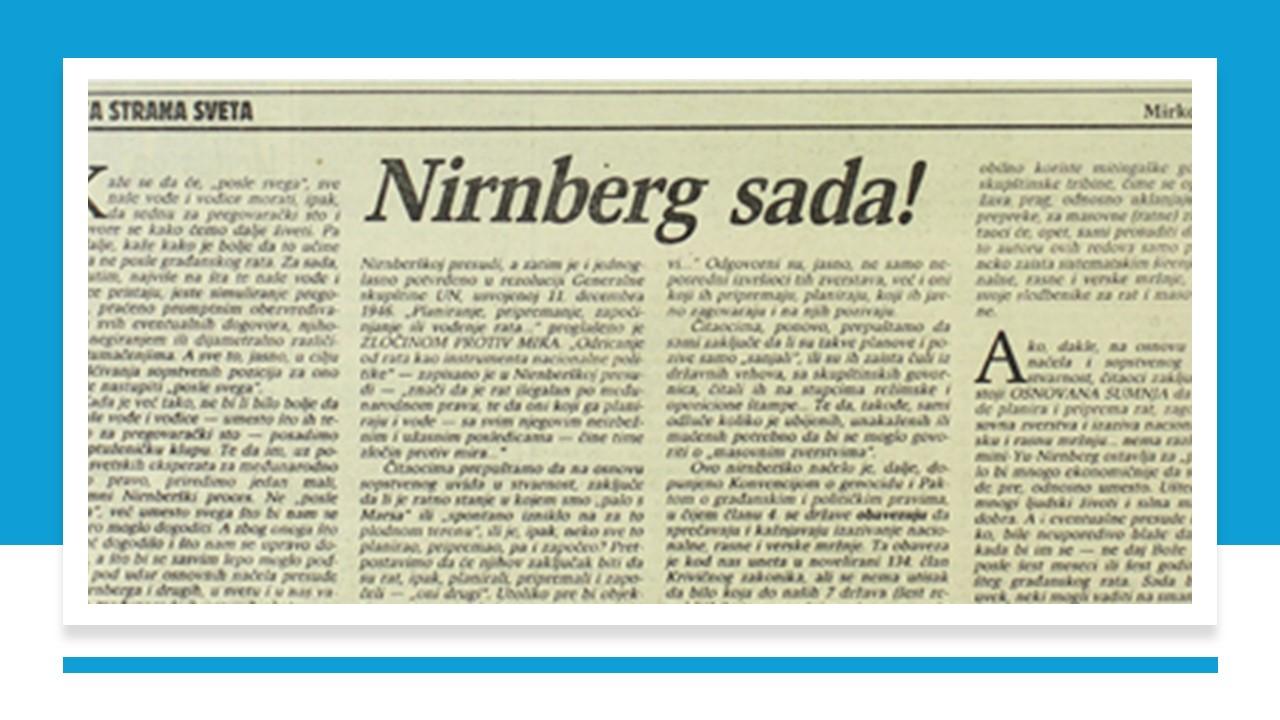‘Wouldn’t it be better if our leaders, big and small, were forced to sit at the dock instead of the negotiation table? If we could, with the help of global experts in international law, prepare a small, modest Nuremberg trial for them — a trial held not after, but rather instead of everything that might soon befall us?’[1]
These were the words of Mirko Klarin in 1991, on the eve of the Yugoslav wars that dissolved the former federation. Klarin’s appeal to prevent ‘everything that might soon befall us’ was considered prophetic by many. War did indeed break out shortly thereafter, and two years later, the Hague Tribunal (ICTY) was established.
Unfortunately, by then it was too late for the preventive purpose of a ‘mini-Yugoslavian Nuremberg’ to be fulfilled. Instead of merely issuing a warning to the ‘leaders’, by May 1993, we had to contend with the crimes already committed. Despite the scepticism — even among its own founders — the Hague Tribunal began this work, albeit timidly, beset by many obstacles. The first trial was held more than two years after the Tribunal’s founding. This delay probably also accounts for why this court, as the first international criminal court after Nuremberg and Tokyo, did not present a strong enough warning to those who, in the summer of 1995 in Srebrenica, committed one of the greatest single crimes on the territory of Europe after World War II.
The Tribunal’s existence in July 1995 was nevertheless invaluable to the Srebrenica investigation. Investigators were already on site, collecting evidence, before the month’s end. The investigation, although thorough and efficient, understandably brought little comfort to the thousands who had lost family and loved ones. The process of investigation and subsequent trials of those accused of the Srebrenica crimes — including proceedings against Mladić and Karadžić — would take more than 20 years to complete.
Does that mean it would have been better if the Hague Tribunal had never existed? Does it suggest that Mirko Klarin’s instinct in 1991 to warn power-hungry leaders that they could be held accountable for belligerent and inhumane acts was pointless? No, it wouldn’t. Without the Tribunal, we might never have known what truly happened throughout the former Yugoslavia. Although the impact of its work on the states that formed after the breakup was limited, this speaks more to the nature of those societies — within whose bounds the crimes were committed — than to any shortcoming of the international court itself.
Had the ICTY been established at the time of Klarin’s appeal, perhaps there would have been enough time to set standards to allow the tribunal greater influence. Instead, not only did the Yugoslav warlords undermine the Tribunal’s significance, but many in the international community have, through their (in)actions, devalued its importance by failing to build on ICTY’s legacy. This opportunity became available through the work of the permanent International Criminal Court (ICC), which began operations in 2003.
More than 30 years after the ICTY was founded as the first international war crimes court since the Nuremberg and Tokyo trials, the time has come for a new appeal, very much like Klarin’s in 1991. Perhaps it is already too late. Today’s global stage lacks any alarm bells to warn against or regulate the torrent of war crimes that has become increasingly concentrated. The ICC, which should act as that warning signal, has failed to become one in its 20 years of existence. It failed to build on ICTY’s legacy or to establish its own robust judicial standards to protect humanity. Klarin’s 1991 call for a local “mini-Nuremberg” should have already served as a call for a “great and permanent Nuremberg”— a lasting international criminal court that could shield the world from the erosion of humanity.
Perhaps then the global corporate system that fuels war machineries around the world would not have been able to develop its deadly mechanisms for depriving humanity of its humanness. Crimes against humanity represent the height of dehumanization, whether committed intentionally — as genocide — or ‘merely’ by blindly following cruel and monstrous orders. Inhumanity, cruelty and the absence of compassion are at the essence of such crimes, and from the standpoint of humanity, they transcend legal definitions of severity. Those are exactly the crimes we are currently witnessing across continents.
Intent and scale may fit the definition of genocide, but they also exceed it. It is no longer just about a national, ethnic, racial or religious group targeted for destruction. The arrogance of those in power — and their silent allies, driven by profit and personal interest — has even normalized the intent to ‘partially or wholly’ destroy humanness. The crime of crimes we are now witnessing might thus rightly be called “humanicide”.
Just as the Hague Tribunal and its work were not in vain, and Klarin’s appeal ‘Nuremberg now!’ was not meaningless, neither is speaking up today. It is more necessary and more meaningful than ever to raise our voices and demand ‘Nuremberg forever!’, not because we want to establish yet another international court — we already have one — but to bring before that court the untouchable ‘leaders’ who, before our very eyes, are committing humanicide and collectively stripping us of our own humanness.
— Mina Vidaković
[1] Mirko Klarin, “Nuremberg Now!”, Daily “Borba”, Belgrade May 16th,1991

